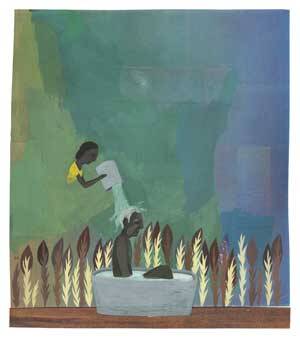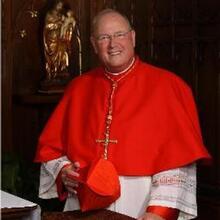One summer day when my family was out for a Sunday drive, we stopped at a shrine at the neighboring parish of St. Joseph in Manchester, Mo. The old church had a well, perhaps the first I had ever seen. Dad held me up so I could peer down, but I could see no bottom. I cupped my ear and heard only silence. Dad gave me a rock to drop into it, and I waited for what seemed forever before I heard a muted splash of water, way down deep. Mystery, meaning, depth, a hint of the beyond, life-giving water—all seemed evident at that well.
Seventeen years later, in summer 1973, I visited Ireland as a 23-year-old seminarian. When a friend and I walked, rode bikes and buses through lush villages, and hitchhiked back roads, I found them again—the wells. But I was not alone in sensing mystery and meaning in them. The Irish called them “holy wells.”
“Why are you surprised?” asked the parish priest in Kilbeggan, as he hosted us for tea and brown bread. “Think of Jacob’s well or the Samaritan woman at the well in the Bible,” he went on. “Wells have always been places of meaning, mystery, the beyond, life itself.”
Never, though, has my appreciation for the power of a well been deeper than it was last May when I traveled to Ethiopia on a trip sponsored by Catholic Relief Services. Our destination was at the end of a rough ride of two hours south of the capital, Addis Ababa. The heroic local bishop, Abraham Desta, was waiting for us in Meki, where he invited us in to freshen up and take a cup of potent Ethiopian coffee (coffee was first brewed here) and then packed us back into our four-wheel drive vehicle for another dusty ride through 15 miles of desolate fields.
“Simply put, there’s no surface water here in Ethiopia,” my brave brother bishop explained to me and my companions, Joseph Kurtz, the archbishop of Louisville; Carolyn Woo, dean of the school of business at Notre Dame; and Art Wigchers, a benefactor of C.R.S. “We’ve only got two main rivers in the whole country,” he went on. “The rains are completely unreliable. Our people are always only one dry season away from famine. The frustration is that water is abundant way down deep, but our people can’t dig that far to get to it.”
That explained the carcasses of cows and sheep we saw through the clouds of dust, the drooping crops, and the emaciated, parched people who stared at us from the cracked fields. That explained why C.R.S. was so committed to digging wells all over Ethiopia; $45,000 does the job, we were told.
As we neared the site of the C.R.S. project, there they were: hundreds of jubilant, applauding, beaming, hopeful folks. They had all come to the new C.R.S. well. We prayed, we hugged, we blessed the well and the pump. And I got to throw the switch!
Rising from deep down, a rushing swirl came through the silence and burst through: the clean, clear water from the well. The stream spread...cisterns brimmed over...the thirsty cattle sniffed the water and started to trot toward us...the children splashed...the jugs were filled up...the tears of jubilation flowed...the villagers danced...the hoses carrying water to the surrounding fields and villages swelled up. “I’ve never seen water come up from the ground,” whispered one of the elders to me as Bishop Abraham translated.
“Now our children can go to school,” another exclaimed. The bishop explained that the nearest river was a three-and-a-half-hour trek away, so the children spent seven hours every day to get the essential water. They could hardly go to school.
“Our crops will be green again,” beamed another villager. “Our cattle and sheep will live.”
“Our babies will not get sick, and we can soothe and bathe our elders as they prepare to die.”
No wonder Jesus referred to himself as “living water.” No wonder C.R.S. is committed to digging wells. There is indeed mystery, meaning, depth, a hint of the beyond, life itself, in a well.








